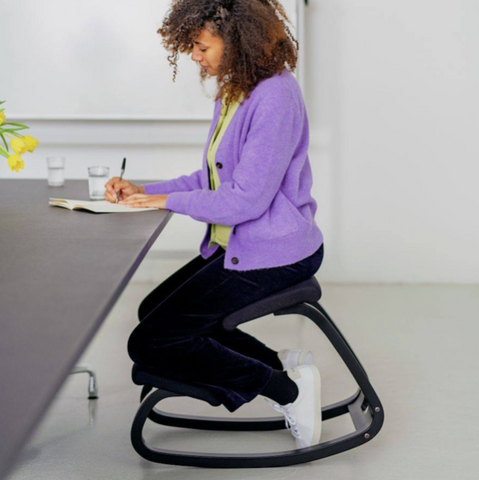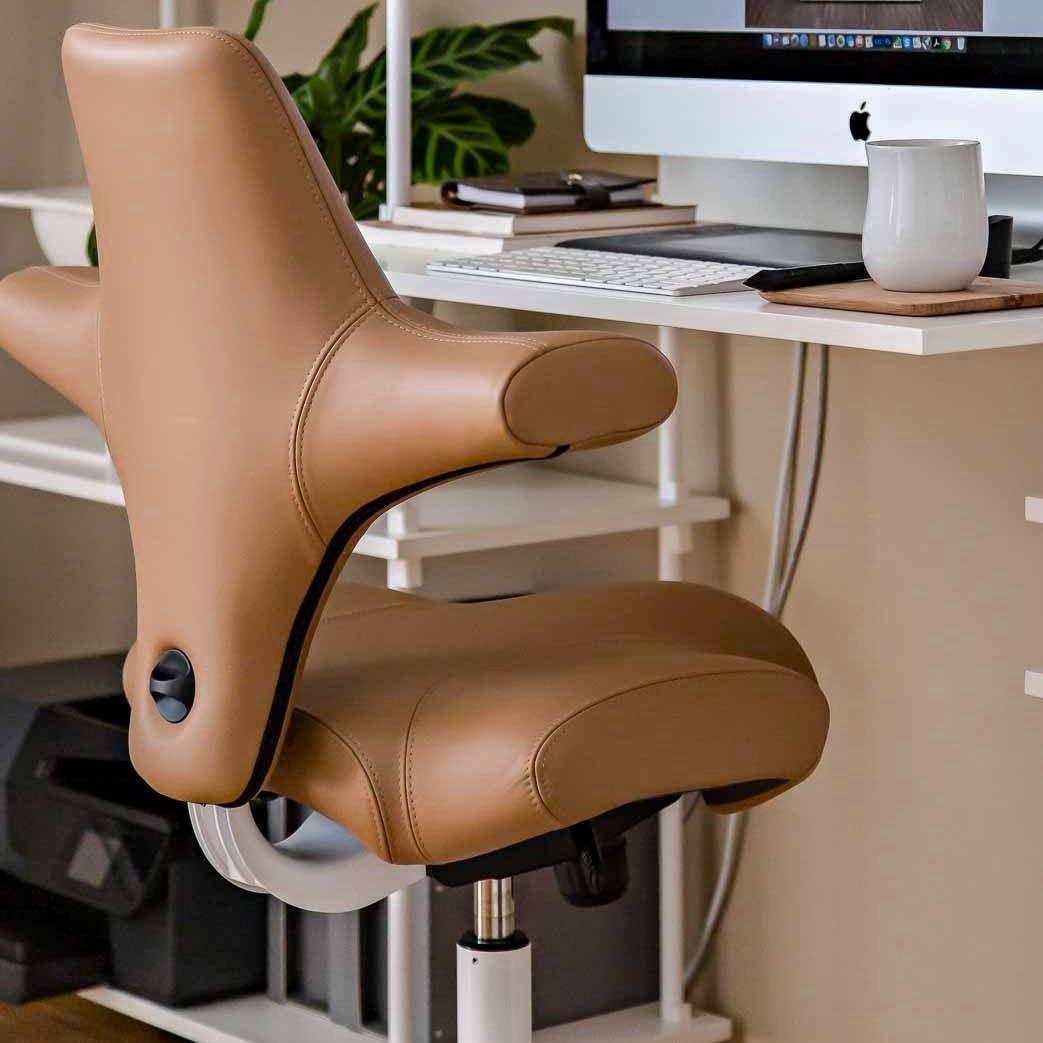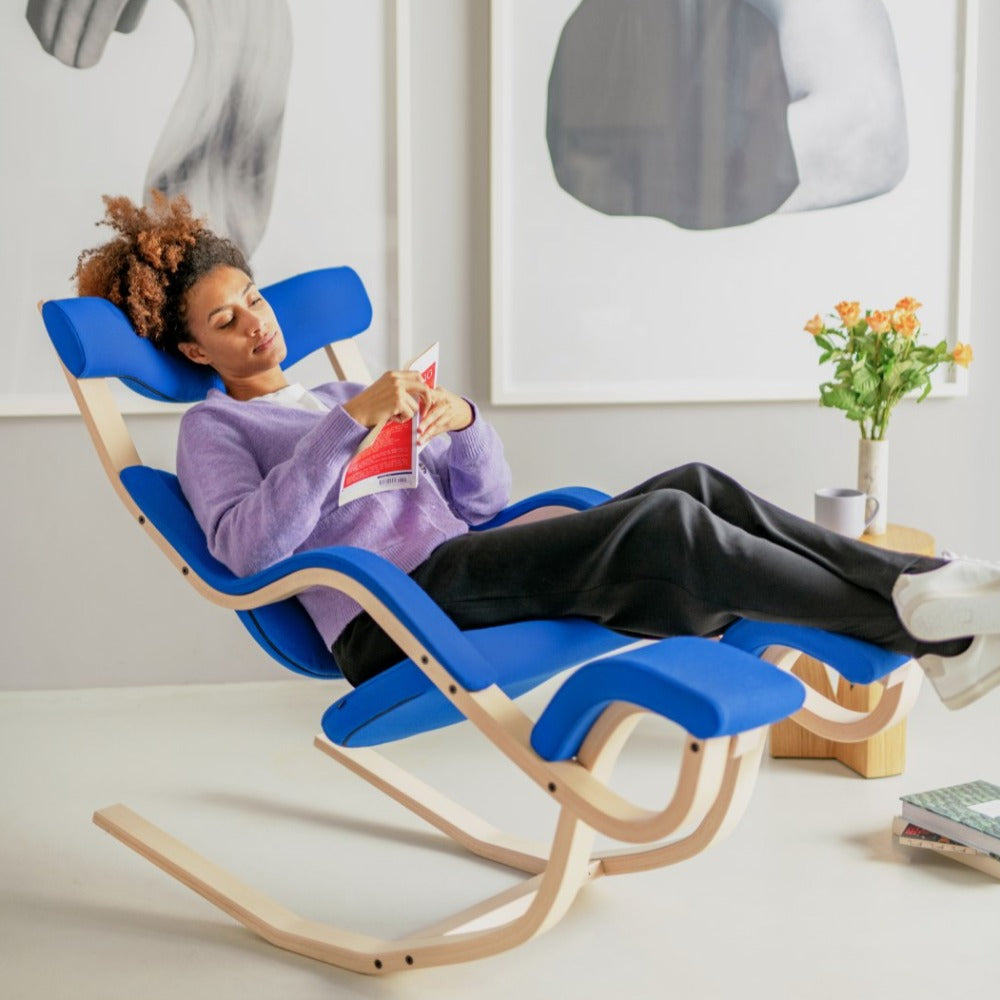What is active sitting?
As the name implies, active sitting involves movement while seated. Peter Opsvik, designer of the Varier active chairs, says "The best position is always the next one." Active seats offer this opportunity for finding the next best position.
In the last 15 years, research studies have shown that sedentary behaviors and prolonged sitting are detrimental to your health. More recently, exercise scientists(1) have agreed that activity does not cancel out the negative impact of being sedentary. Much like eating an apple does not cancel the effects of smoking a cigarette.
As there is no perfect posture, the recommended consensus is for you to change position as often as possible. Let’s face it, as James Hamblin wrote, “you can’t undo sitting”. We have no choice but to sit, so we must ensure that we sit with our wellness in mind.

Active sitting has multiple benefits(2). It promotes the strengthening of core muscles, which in turn reduces the possibility of developing back pain. Frequent movement causes muscle contraction. This increases blood flow, which results in better oxygenation. What a great way to energize both body and mind as you work from your home or office.
There are a few distinct active chair types available on the market, and bear in mind some designs may not work for you if you have specific health conditions.
The classic: Tilting chairs
Tilting is what transforms a traditional seat into an active chair. Different models(3) exist, such as single point pivot, synchronous tilt, or knee tilt. While each of these mechanisms reclines the chair's backrest and adapts the angle of the seat, the difference in experience varies significantly.
HAG or 9to5 Seating or Eurotech, offer excellent versions of the tilt function. These chairs are the most popular due to their familiar design.
Pros & Cons
+ Requires no adaptation periode
+ Many available options
- Posture doesn’t improve significantly
- Activity relies on conscious movement
The Allrounder - Capisco Chair
The HAG Capisco is a category of its own. Peter Opsvik designed this bestseller 40 years ago with a mission to improve posture and movement which are vital to better sitting. The saddle seat and overall unique open design offer endless ways to sit or half stand, encouraging you to vary your position and stay energized.
The increased awareness of the effects of sedentary behavior and the rising popularity of standing desks make the Capisco more relevant than ever.
Pros & Cons
+ Closest to a typical task chair
+ Offers many sitting options to promote movement
+ Only chair that fits a standard and sit-to-stand desk
- Saddle shape is not adjustable and may not fit everyone
The trendsetter: Kneeling chairs
Kneeling chairs have been also used for over 40 years. Also originally designed by Peter Opsvik, benefits to the user's posture include widening the angle between torso and legs, redistribution of sitting pressure points, and inducing naturally a proper spinal curvature.
Varier, which distributes Opsvik's designs, is the bestseller in this category. It offers a uniquely engineered flexible design made of plywood that increases movement to keep you active.
Pros & Cons
+ Optimal posture improvement
+ Reduced pressure points
+ Increased unconscious & conscious movements
- May take a couple of weeks to adapt to sitting differently
The bold statement: Saddle chairs
As with the Kneeling chairs, Saddle chairs, encourage you to sit in an upright position. This creates posture similar to when riding a horse; with your pelvis in a neutral, upright position and your spine supporting your upper body.
This chair is popular amongst professionals who need to move around their space while sitting upright, with good support. The market leader in this category is Salli. It also offers a tilt or 360-degree sway mechanism for increased movement and a split saddle for additional health benefits.
Pros & Cons
+ Best rated posture improvement
+ Optimal pressure distribution
+ Increased unconscious & conscious movements
+ Multiple accessories to adapt to any type of work
- May take up to a couple of weeks to adapt to sitting differently
- Isn’t compatible with regular desk height
The creative: Sway chairs
Sway chairs, such as the Corechair, have become market leaders due to their sculpted seat (on which your derriere has never felt more comfortable!), their pelvic stabilizer, slide-preventing design and its ultimate motion flexibility.
Pros & Cons
+ Posture improvement
+ Requires little time to get used to it
+ Increased unconscious & conscious movements
- Seat shape may not work for everyone
The in-between: Perch stools
Think of them as providing a halfway point between sitting and standing. You can naturally engage the core, back, leg, and hip muscles, while seated on a Perch stool.
Varier or Corechair offer great stool options, which are loved by sit-to-stand desk owners looking for an adequate alternative to their common office chair.
Pros & Cons
+ Posture improvement
+ Increased unconscious & conscious movements
+ Compact design
- May not work for everyone's all day sitting
The bouncing: Ball chairs
The ball chair design has been recognized as a true active and ergonomic seating as it promotes movement and engages your core. It is a very versatile object as you can use it for desk tasking but also for stretching, yoga, exercise and much more.
Venn Designhas taken this basic design to a whole other level providing a premium unique multi-layered laminate construction ensuring proper sitting load distribution and temperature control for better comfort.
Pros & Cons
+ Posture improvement
+ Increased unconscious & conscious movements
+ Multi use & fun design
- May not work for everyone's all day sitting
So, where do you start?
The many options may seem daunting. Which one will work for you? Don’t despair! All of these active chairs offer a significant step towards a healthier and more productive workspace. You can discover the detailed benefits of each chair in the product information pages of the different models.
For a quick personalized recommendation, we put together a simple 10 second / 4-question quiz to guide on on what could be a great fit for you. Click HERE to get started!
Feel free to message us or call us (833 888 5289) if you have any questions we are here to help.
References:
1) The Futility of the Workout-Sit Cycle by James Hamblin for The Atlantic
2) Active Sitting Guide: 6 Reasons To Really Consider It by Meredith Chandler for the Ergonomics Health Association
3) Synchro Tilt and Other Tilt Mechanisms in an Office Chair Explainedby George C in Ergonomic Trends











